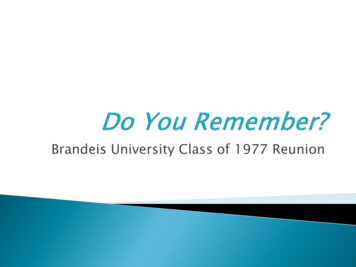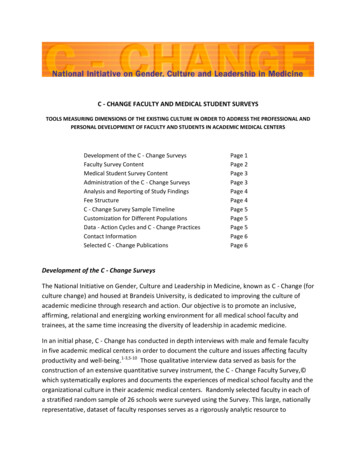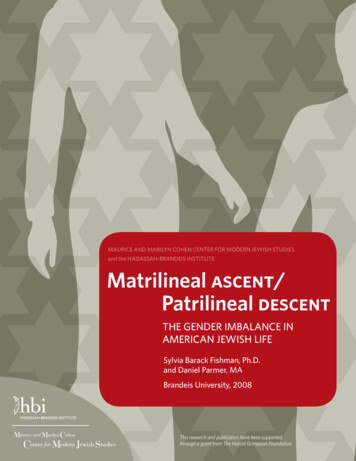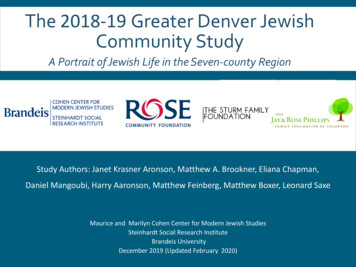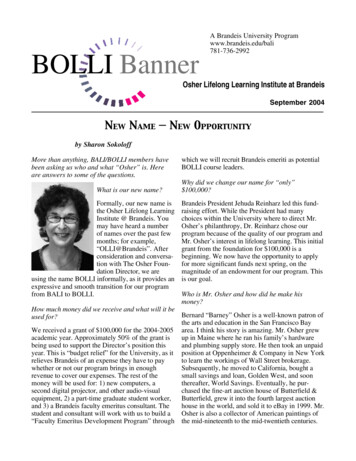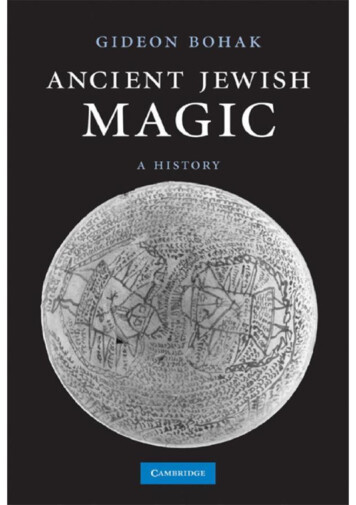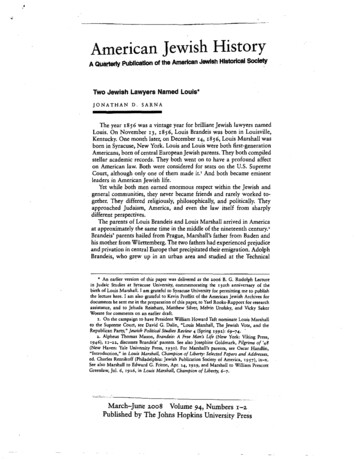
Transcription
American Jewish HistoryA QIJilrteriY P11bllcatlon of the Amerloan J.ewlsh Hlstorloal SOcietyTwo Jewish Lawyers Named Lollis*JONATHAN D. SARNAThe year r856 was a vintage year for brilliant Jewish lawyers namedLouis. On November 13, r8s6, Louis Brandeis was born in Louisville,Kentucky. One month later, on December 14, r856, Louis Marshall wasborn in Syracuse, New York. Louis and Louis were both first-generationAmericans, born of central European Jewish parents. They both compiledstellar academic records. They both went on to have a profound affecton American law. Both were considered for seats on the U.S. SupremeCourt, although only one of them made it.' And both became eminentleaders in American Jewish life.Yet while both men earned enormous respect within the Jewish andgeneral communities, they never became friends and rarely worked together. They differed religiously, philosophically, and politically. Theyapproached Judaism, America, and even the law itself from sharplydifferent perspectives.The parents of Louis Brandeis and Louis Marshall arrived in Americaat approximately the same time in the middle of the nineteenth century.'Brandeis' parents hailed from Prague, Marshall's father from Baden andhis mother from Wiimemberg. The two fathers had experienced prejudiceand privation in central Europe that precipitated their emigration. AdolphBrandeis, who grew up in an urban area and studied at the Technical,. An earlier version of this paper was delivered as thein Judaic Studies at Syracuse University, commemorating1006theB. G. Rudolph Lecturersorh anniversary of thebirth of Louis Marshall. I am grateful to Syracuse University for permitting me to publishthe lecture here. I am also grateful to Kevin Proffitt of the American jewish Archives fordocuments he sent me in the preparation of this paper, to Yael Rooks Rapport for researchassistance, and to Jehuda Reinharz, Matthew Silver, Melvin Urofsky, and Vicky SakerWoeste for comments on an earlier draft.I. On the campaign to have President William Howard Taft nominate Louis Marshallro the Supreme Court, see David G. Dalin, "Louis Marshall, The Jewish Vote, and theRepublican Party," jewish Political Studies Review 4 (Spring 1992.); 69-?4· ·2. Alpheus Thomas Mason, Brandeis: A Free Man's Life (New York: Viking Press,1946), n-2.2., discusses Brandeis' parents. See also Josephine Goldmark, Pilgrims of '48(New Haven: Yale University Press, 1930). For Marshall's parems, see Oscar Handlin,"Introduction," in Louis Marshall, Champion of Liberty: Selected Papers and Addresses,ed. Charles Reznikoff (Philadelphia: jewish Publication Society of America, 1957), ix-x.See also Marshall to Edward G. Friton, Apr. 2.4, 192.9, and Marshall to William PrescottGreenlaw, Jul. 6, 192.6, in Louis Marshall, Champion of Liberty, 6-7.0 ---"'-·----------March-June 2008 Volume 94, Numbers r-2Published by The Johns Hopkins University Press
2AMERICANJEWISHHISTORYSchool of Prague, was imbued with German liberalism and sympathizedwith the Revolutions of r848. Jacob Marshall, born in a border village,was more traditional in his outlook. Both men luxuriated in the freedomAmerica granted them, and both were married to fellow immigrants inthe United States (Brandeis to Frederika Dembitz and Marshall to ZilliStrauss). Adolph Brandeis, who became a grain and produce merchantin Louisville, prospered. His youngest son, Louis, grew up in what hisbiographer calls an "atmosphere of comfort and success."' The family'sfinancial fortunes only declined later, in the r87os, when Louis Brandeiswas a teenager. Jacob Marshall, by contrast, experienced real poverty.For a time, he barely scraped by: he was a porter, a peddler, and ran afruit stand. The year his eldest son, Louis, was born, he entered the hideand leather business and did better, but never became rich.Religiously the Brandeises and Marshalls differed markedly. TheBrandeises formed part of an extended network of liberal central European Jews, some of whose ancestors had followed the pseudo-messiahJacob Frank. Their descendants-people with surnames such as Wehle,Goldmark, Dembitz, and Brandeis-married one another and, with a fewnotable exceptions (the most outstanding being Louis Brandeis's Orthodox uncle, Lewis Dembitz), steered clear of formal religion. Brandeis'extended family (he called them "unser eins") cherished instead a seriesof "desirable virtues."' Attributed by one descendant to Frank, theseincluded high intelligence, a blameless mode of life, and "the mosc rigidsense of morals, justice and charity."' Adolph and Frederika Brandeiswere buried in Louisville's Adas Israel cemetery but maintained onlyminimal ties, so far as we know, to Jewish religious life. They observedno Jewish holidays or rituals whatsoever. 7The Marshalls, by contrast, were Orthodox Jews. They kept kosher,observed the Sabbath, and celebrated Jewish holidays. When the Syracusesynagogue, Society of Concord (Keneseth Shalom), split over the introduction of religious reforms in r864, Jacob Marshall was one of those whoMason, Brandeis, 24.Goldmark, Pilgrims of '48, 192.-93; Remini.scences of Frederika Dembitz Brm1deis,Alice G. Brandeis (n.p.: privately printed, 943).See, for example, Brandeis to Alfred Brandeis, Jul. 28, r904, in The Family Lettersof Louis D. Brandeis, eds. Melvin I. Urofsky and David W. Levy (Norman: University of3·4·rrans.5·Oklahoma, 2.002.), 90.6. Theodore Wehle, "Notes on the Wehle Family and Their Connection with the FrankMovement," unpublished paper quoted in Goldmark, Pilgrims of '48, 194·7· Ben Halpern, A Clash of Heroes: Brandeis, Weizmamz, and American Zionism (NewYork: Oxford University Press, r987), 62-69; Carol Ely, jewish Louisville: Portrait of aCommunity (Louisville: Jewish Community Federation of Louisville, :1003), 45·
J.o.Sarna: Two Jewish Lawyers Named Louis3departed to form the more Orthodox Adath Jeshurun. Louis Marshall'sparents remained traditionally observant for the rest of their lives."Orthodox or not, central European Jews in America, like the Brandeises and the Marshalls, cultivated the ideals of hi/dung. They promotedboth the acquisition of knowledge and a sharpened appreciation foreverything "good, beautiful and true."' They believed deeply in thevalue of education. Both Louises, in response, made their parents proud.Brandeis, at sixteen, won a gold medal at the Louisville Male HighSchool for "pre-eminence in all his studies" and spent three terms inGermany, where he became an outstanding student at Dresden's AnnenRealschule. ' Marshall, with his photographic memory, mastered fourforeign languages-French, German, Latin, and Greek-at Syracuse HighSchool." Neither man went to college but instead, following the customof the day, went directly to law school, where they became legends intheir time. Brandeis at Harvard Law School achieved a record-breakingaverage of ninety-seven, became the class valedictorian, and graduatedseveral months shy of his twenty-first birthday. It was a feat so unusualthat it demanded a suspension of the college's rules in order for him toobtain his diploma." At Columbia University Law School, Marshall managed to complete the entire two-year course in just a year, and was longrecalled as a prodigy who could rattle off cases, complete with precisecitations and page numbers, when called upon in class. Remarkably, hetoo left law school prior to his twenty-first birthday. In his case, it meantthat he never formally received a degree-"two years actual attendancewas required." For several months, until he was old enough to pass thebar, he worked writing briefs for other lawyers.''As newly minted attorneys, Louis and Louis began their careers closeto home. Marshall returned to Syracuse and joined the well-regarded08. Handlin, "Introduction," xiii; Bernard G. Rudolph, From a Minyan to a Community: A History of the jews of Syracuse (Syracuse, NY: Syracuse University Press, 1970),7'9· Jonathan D. Sarna, American Judaism: A History (New Haven: Yale UniversityPress, 2.004), 79·ro. Mason, Brandeis, 2.6-3 z.; Philippa Strum, Louis D. Brandeis: justice for the People(New York: Schocken, 1984), 9-13.r r. Reznikoff, Louis Marshall, Champion of Liberty, xi.12. Mason, Brandeis, 33-48; Strum, Louis D. Brandeis, r8-z.4; Allon Gal, Brandeis ofBoston (Cambridge: Harvard University Press, 1980), 7-ri. For a recollection of Brandeisat Harvard ("The Profs. listen to his opinions with the greatest deference, and it is generally correct."), see Thomas K. McGraw, Prophets of Regulation (Cambridge: HarvardUniversity Press, 1984), 82-83.13. Cyrus Adler, "Louis Marshall: A Biographical Sketch,"' American jewish Year BookJ2 (1930-J931): 23-24; Reznikoff, Louis Marshall, Champion of Liberty, xi, 8.
4AMERICANJEWISHHISTORYlaw firm headed by William Crawford Ruger, later chief judge of theNew York Court of Appeals.' Brandeis moved to St. Louis, close to hisfavorite sister, Fannie, and her husband, and joined a less prestigiouslaw firm headed by a distant relative, James Taussig. Within a year,however, Brandeis returned to Boston and formed a new and more suc-cessful partnership with his socially well-connected friend and classmate,Samuel D. Warren.'' Entering the field when they did, neither Marshallnor Brandeis felt constrained to join a Jewish law firm in order to secureemployment. Discrimination against Jews in the legal profession was asomewhat later development. 16As bright young Jewish lawyers starting out in the profession, the twoLouises received encouragement from the Jewish community. InI8 8o,Brandeis-when he was all of twenty-four-was hired by the UnitedHebrew Benevolent Association of Massachusetts as a plaintiff's attorney.The case ostensibly involved nonpayment on a pledge but soon developed into a more ominous challenge to the Jewish charity's corporateexistence (since subsequent to its organization, the corporate laws ofMassachusetts were changed). Brandeis won the case in the MassachusettsSupreme Court, establishing the principle that "the repeal of a generalcorporation law . does not terminate the existence of corporationsorganized under it. " 17At thirty-five, Marshall was likewise retained to argue a significantcase for the Jewish community. He defended the North American ReliefSociety, set up to relieve the indigent Jews of Palestine, in its effort toobtain funds from the will of a Jew named Sampson Simson, who hadleft money to promote education among the poor Jews of Palestine. Marshall valiantly argued that the Jewish concept of "relief" entailed just thekind of educational assistance Simson had stipulated, and he brought intwo learned rabbis, one traditional and one Reform, to support his case.Nevertheless, he lost 4-3 in the New York Court of Appeals, a defeatthat continued to rankle him some thirty-three years later.'"!4. Adler, "Louis Marshall," 23-24; Reznikoff, Louis Marshall, Champion of Liberty,xi-xii, 8-9.15. Burton C. Bernard, "Brandeis in St. Louis," St. Louis Bar journal II (1964): 53-68;Gal, Brandeis of Boston, u-22.r 6, Jerold S. Auerbach, Unequal justice: Lawyers and Social Change in Modern America(New York: Oxford University Press, 1977), 102-129.17, United Hebrew Benevolent Association v. joshua Benshimol, 130 Mass. 325 (r881 ),Alan Gal erroneously claims that this case merely involved suing a member "for back pay·menr of his annual dues." See Gal, Brandeis of Boston, 73·18. Rikerv. Leo, 133 N.Y. 519 (1892); Reznikoff, Louis Marshall, Champion of Liberty,913-22. On Simson, see MyerS. Isaacs, "Sampson Simson," Publications of the AmericanJewish Historical Society 10 (1902): 109-I7.
J. D. Sarna: Two Jewish Lawyers Named Louis5By the time the North American Relief Society retained him, Marshallwas already deeply involved in Jewish communal affairs. In r878, at agetwenty-two, he helped to found the Jewish Orphan Asylum Society ofSyracuse. Five years later he lectured at the Young Men's Hebrew Association of New York and by r89o stood at the very top of the list of regionalJewish leaders compiled by the Rochester Jewish Tidings (his father appeared lower on that list). By then Marshall's name also had appeared inIsaac Markens' filiopietistic listing of The Hebrews in America (r888). Inr89r Marshall was invited to join a national delegation of Jews askingPresident Benjamin Harrison to intervene in order to stop the renewedpogroms against Russian Jews. During those years the unmarried Marshalllived with his parents in their modest Orthodox home. According to onesource, "he loved the many ritual observances" they kept. Even after heleft Syracuse for New York and defied expectations by finally marryingat the age of thirty-eight (see Figs. 2 and 3 ), he would return annuallyto celebrate the Passover seder with his parents.'' Marshall affiliated inNew York with the Reform Temple Emanu-El but maintained many ritualpractices, much like his friend and fellow congregant, banker Jacob H.Schiff. He believed, as Schiff did, that "there is only one Judaism . allof its followers united by the bond of religion."" That explains how hecould be chairman of the board of the Jewish Theological Seminary andpresident of Temple Emanu-El simultaneously.''Brandeis, by contrast, kept away from Jewish communal affairs inBoston during his early decades in the city, notwithstanding the one casethat he argued and won for the United Hebrew Benevolent Association.He observed no Jewish rituals and was indeed quite contemptuous ofthe "crude, materialistic Boston Jews" whom he encountered. 21 "Thereis nothing in the first fifty-four years of Brandeis's life," Philippa Strumconcludes, "to suggest that being Jewish was of any significance in it. "z. 319.Reznikoff, Louis Marshall, Champion of Liberty, xiii; Rudolph, From A Minyanto a Community, 89, 104, 124; Isaac Markens, The Hebrews in America (New York:privately published, r888), 229.20. Marshall to Editors, jewish Daily News, Feb. 7, 1906, in Reznikoff, Louis Marshall, Champion of Liberty, 798. For the parallel to Schiff, see Naomi W. Cohen, jacobH. Schiff: A Study in American ]etvish Leadership (Hanover. NH: University Press of NewEngland I Brandeis University Press, 1999), 97-102.21. See Horace Stem, Louis Marshall: An Appreciation (I9JO), quoted in Reznikoff,Louis Marshall, Champion of Liberty, 813.22. Brandeis to Alice Goldmark Brandeis, jun. 18, 1919, in Letters of Louis D. Brandeis, eds. Melvin I. Urofsky and David W. Levy (Albany: Stace University of New YorkPress, 1975), 4:401.23. Philippa Strum, "lnrroduction," in Brandeis on Democracy, ed. Philippa Strum(Lawrence: University Press of Kansas, 1995), IJ.
6Fig.AMERICAN2.JEWISHHISTORYLouis Marshall, c. r894, about the time he left Syracuse to settle in NewYork City (Courtesy Peter H. Schweitzer).The only religious holiday mentioned in the Brandeis letters from thistime is Christmas, which he observed with a tree. Even his marriageconsisted of only a civil ceremony. It was conducted by his brother-inlaw, Felix Adler, who had earlier renounced Judaism to found the EthicalCulture movement. 4Brandeis did not live near Jews, did not belong to a synagogue, gaveonly perfunctory gifts to Jewish charities until he became a Zionist, andsocialized largely with non-Jews. Prior to his conversion to Zionism,24. Gal, Brandeis of Boston, 72. On Felix Adler, see Benny Kraut, Front Reform .fudaism to Ethical Culture: The Religious Evolution of Felix Adler {Cincinnati: Hebrew UnionCollege Press, 1979); and RobertS. Guttchen, Felix Adler (New York: Twayne, 1974).
J. D. Sarna: Two Jewish Lawyers Named Louis7some questioned whether he was Jewish at all.'' That explains whyBrandeis' name did not appear in the Jewish Encyclopedia (I90I-I9o6),while Marshall's did. A few years later, the American Jewish Year Book,coedited by Henrietta Szold, contacted Brandeis in order to include himin its biographical listing of Jews prominent in the professions in theUnited States, but he failed to reply. Unsurprisingly, Marshall replied atlength.''The religious differences between Marshall and Brandeis, as well asthe difference in their respective Jewish communal involvements, bespeaksignificant political and philosophical differences between these two Jewishgiants of the law. As time went on, these differences became ever moreapparent. The religiously minded Marshall characterized himself as apolitical conservative ("! have been accused of . being an eighteenthcentury reactionary in my views on government" 27 ). He supported theRepublican Party, continuing to do so even in r9r2, when so manyother Jews, including Schiff, abandoned it. "It is because the Republicanparty . stands for the preservation of the Constitution, and for thefundamental principles for which the Fathers of the Republic foughtand bled, that I would deem myself unpatriotic should I desert it at thisjuncture," he wrote. To depart from the principles of the RepublicanParty, he significantly declared, "would be as inexcusable as a departurefrom my religious convictions." z.H To some extent, indeed, his Republicanconvictions complemented his religious convictions.By contrast, the religiously latitudinarian Brandeis devoted himself tono particular party but rather to Progressivism as a broad political agenda.He mistrusted big business and cast himself as a defender of the people.A mugwump Republican in his early career, he shifted to the Democratsin r884 but abandoned the party when it supported William JenningsBryan and the Free Silver movement-a position he considered economi-cally unsound. In r9o8 he supported William Howard Taft, the Republican candidate for president, and later associated with the ProgressiveRepublicans, particularly Robert La Follette. Unlike Marshall, he shiftedparties in I9I2 and became an ardent supporter of Woodrow Wilson.25. Gal, Brandeis of Boston, 131; Jonathan D. Sarna, "'The Greatest Jew in the WorldSince Jesus Christ': The Jewish Legacy of Louis D. Brandeis,,. American jewish History 8r(Spring-Summer 1994): 346-64, esp. 347-49·26. jewish Encyclopedia, s.v. "Marshall, Louis"; American jewish Year Book 6( 1904-1905): 53, 69, 15 r. Brandeis was similarly rejected for membership in rhe AmericanJewish Committee. See Sarna, "Greatest Jew in the World," 348.27. American jewish Year Book 15 (1913-14): 178.28. Marshall to Jacob H. Schiff, Aug. 13, 1912, in Reznikoff, Louis Marshall, Champion of Liberty, 1154-55·
8AMERICANJEWISHHISTORYFig. 3. Louis Marshall and his wife Florence Lowenstein Marshall on their wedding day, May 6, r895 (Courtesy Peter H. Schweitzer).He remained a Democrat for the remainder of his life." "Experience oflife has made me democratic," Brandeis explained in r9r3. "I began tosee that many things sanctioned by expert opinion and denounced bypopular opinion were wrong." JoWhereas Brandeis gravitated toward public opinion, Marshall shrankfrom it, viewing appeals to mass democracy with grave mistrust. In thewords of his biographer, "he considered those who advocated the directprimary or the referendum misguided or demagogues or rogues."'' "It29. Strum, Louis D. Brandeis, 67; Gal, Brandeis of Boston, 25.30. Brandeis, interview in the New York Times Annalist (I913), reprinted in Srrum,Brandeis on Democracy, 36.3 1. Reznikoff, Louis Marshall, Champion of Liberty, xvii.
J. D. Sarna: Two Jewish Lawyers Named Louis9was necessary always," Marshall believed, "to elevate laws above menand to avoid the hysteria of mass action. " 3' As we shall see, this helpedto define his differences with Brandeis in the great debate over a Jewishcongress.As much as Marshall feared the masses, he venerated the power of theindividual. He cherished personal liberties and somewhat mistrusted biggovernment. He was particularly keen to limit the federal government'spowers in keeping with the Tenth Amendment ("The powers not delegatedto the United States by the Constitution, nor prohibited by it to the States,are reserved to the States respectively, or to the people.") Not even childlabor, he thought, "should be brought within federal control."" He alsoopposed the reasoning that undergirded twentieth-century workmen'scompensation legislation, believing that individuals should be responsible for their own actions. In r9rr he extolled as "splendidly reasoned,clearly expressed, and characterized by a fine sense of moderation" aunanimous New York State opinion in his favor (Ives v. South BuffaloRailway Company) that tossed out the state's workmen's compensationact because it entailed "the taking of the employer's property withouthis consent and without his fault. " 34 He characterized the decision as "asubstantial dike against the tide of socialism" and "a potent influence inthe direction of sanity in respect to legislation in which sociology and lawcommingle. "35 Brandeis, by contrast, characterized the same decision as"woefully wrong."'' Where Marshall worried, particularly in the yearsfollowing World War I, that "our Government is gradually being transformed into a Socialistic state," Brandeis, the Progressive, advocated "theco-operative idea . [that] management and labor should be one.""Minimum wage legislation similarly divided the two men. Brandeissupported the minimum wage, just as he had earlier supported lawsprohibiting women from working more than ten hours a day. Progressivelegislation of this sort, he believed, remedied clear social evils. In this case32. Ibid.33· Ibid., 1003.34· 201 N.Y. 271 at 298 (1911).35· Marshall ro William E. Werner, Apr. r, 1911, box 158o/microfilm 1786, LouisMarshall Papers, Jacob Rader Marcus Cenrer of the American Jewish Archives, Cincinnati(hereafter cited as Marshall Papers).36. Brandeis ro Editor of The Survey, Apr.(?) 1911 [The Survey, Apr. 29, r9n], inUrofsky and Levy, Letters of Louis D. Brandeis, 2:427. See also Brandeis's comments in"The Living Law" (1916), reprinted in Strum, Brandeis on Democracy, 62.37· Marshall (1925), as quoted in Morton Rosenstock, Louis Marshall, Defenderof jewish Rights (Detroit: Wayne State University Press, 1965), 29; Brandeis, quoted in"Laborers as Directors Wirh Boss Possible, Says Louis D. Brandeis" (1915), reprinred inStrum, Brandeis on Democracy, ro6.
10AM E RIC ANJ E WISHH IS T 0 R Ythe ills in need of a cure were that, first, "a majority of the women inindustry were receiving as wages less than was necessary for their decentsupport; and secondly, that such inadequacy of wages resulted on the onehand in a reduction of vitality and in ill health, and on the other handin immorality and the corruption of the community." He cited a largebody of literature from around the world that supported minimum wagelegislation as beneficial and insisted that the goal of curbing evil justifiedthe limitations on personal liberty the minimum wage entailed.'"Marshall believed government had no business intruding into the freemarketplace of relationships between employers and employees. To hismind, constitutional guarantees of personal liberty trumped well-meaningefforts to combat social evil. "There must be a limit to the so-calledpolice power," he insisted. "The power to fix a minimum wage impliesthe power to fix a maximum wage." Besides, he asked, "what right hasthe Legislature to say to me how much or how little I may receive forthat which belongs to me-my labor." While Marshall did favor healthregulations and rules limiting the number of hours that women worked,he drew the line at the minimum wage. He believed it violated "the libertyof the individual, which, after all, is his most precious possession." 39Marshall's emphasis on individual liberty helps explain why, when itcame to human rights issues, it was he, the self-styled conservative, whostaunchly advocated for persecuted individuals and groups, far morethan did Brandeis, the Progressive. Brandeis worried about economicdisparities, about privacy, and late in life about free speech, but it wasMarshall who made his reputation as the "champion of liberty" for Jewsand other minorities. Marshall's name first became associated with thistheme during the first decade of the twentieth century, during his longand ultimately successful campaign to abrogate America's r8p treatyof commerce with Russia. Over and over in his arguments he insistedthat American Jews should enjoy the same liberty as other Americansin trading or traveling within the tsar's empire. Nor was this just publicposturing, as it may have been for some. In a private letter to the Jewishleader Simon Wolf, Marshall described the issue as one that "relates tothe integrity of American citizenship, to the rights of our citizens underthe Constitution of the United States. "4o38. Louis D. Brandeis, "The Constitution and the Minimum Wage," Survey 33(1914-1915): 49I.39· Marshall to Ethel M. Smith, Apr. 29, 1923, box 1594/microfilm 1795, MarshallPapers. Marshall's position was in line with the U.S. Supreme Court decision in Adkins v.Children's Hospital, 261 U.S. 525 (1923), but in a subsequent case, West Coast Hotel v.Parrish, 300 U.S. 379 (1937), Brandeis' position was vindicated.40· Marshall to Simon Wolf, Aug. r8, 191 r, box I sSe/microfilm I?86, Marshall Papers.Jacob Schiff and other Jews, by contrast, defined the battle in particularistic terms, as an
''J. D. Sarna: Two Jewish Lawyers Named Louis11Ironically, the success of Marshall's campaign for abrogation was indirectly indebted to Brandeis, for it was he who helped to sink the politicalfortunes of the Taft administration through public hearings in r9ro thatdisclosed government improprieties in the transfer of Alaskan lands toprivate industry, the so-called Pinchot-Ballinger affair. A weakened Taft,seeking to head off certain congressional action, gave notice of America'sintention to terminate the treaty on December r8, 19rrYLiberty remained Marshall's lodestar as he turned to the debate overimmigration and an ultimately unsuccessful battle to keep America's doorsopen to Jewish and other immigrants.'' For him, he once explained, thiswas a question of "human rights." He fought valiantly to exempt fromimmigration restrictions those who sought "admission to the United Statesto avoid religious or political persecution. " 43 Subsequently, in battlingagainst social discrimination, he again stressed the themes of liberty andequality. "We must insist upon equality of right and of treatment," hewrote in response to Harvard University's decision to limit the number ofJews it would accept. "The only tests that we can recognize are those ofcharacter and scholarship."" Earlier he worked hard behind the scenesto aid Leo Frank, the Atlanta factory manager wrongly charged withmurder amid just the kind of mass hysteria Marshall detested. Whilemost Jews, including Louis Brandeis, feared Jewish public involvementin the case, Marshall eventually rallied to Frank's defense, seeking to aid"the unfortunate victim of injustice. "4s "My interest in this case," heeffort to force Russia to dismantle the Pale of Settlement and improve rhe lot of its Jewishcommunity. On the campaign, see Reznikoff, Louis Marshall, Champion of Liberty, 49-roS;jonathan D. Sarna and Jonathan J. Golden, "The Twentieth Century Through AmericanJewish Eyes: A History of the American Jewish Year Book, 1899-1999,'' American JewishYear Book 100 (2ooo): 18-20; Rosenstock, Louis Marshall, 71-79;Judith Goldstein, ThePolitics of Ethnic Pressure: The American Jewish Committee Fight against ImmigrationRestriction, 1906-I9I7 {New York: Garland, 1990), 135-183; Naomi W. Cohen, "TheAbrogarion of the Russo·American Treaty of 1832," Jewish Social Studies 25 (Jan. 1963):3-41; and Naomi W. Cohen, Not Free to Desist: The American Jewish Committee r9o6-r966(Philadelphia: Jewish Publication Society of America, 1972), 54-80.41. Strum, Louis D. Brandeis, 132-39, provides details of the affair.42. Reznikoff, Louis Marshall, Champion of Liberty, 109-242; Rosenstock, LouisMarsha/J, 79-89.43· Marshall to Senator Edward D. Smith, Feb. 17, 1914, in Reznikoff, Louis Marshall,Champion of Liberty, 128; Marshall to S. 0. Levinson, Jan. 8, 1915, in Reznikoff, LouisMarshall, Champion of Liberty, 246.44· Marshall to A. C. Ratshesky, Jun. 17, 1922, in Reznikoff, Louis Marshall, Champion of Liberty, 267; Rosenstock, Louis Marshall, 245-53. For background, see JeromeKarabel, The Chosen: The Hidden History of Admission and Exclusion at Harvard, Yale,and Princeton (Boston: Houghton Mifflin, zoos), 77-109.45· Brandeis to Roscoe Pound, Nov. 27, 1914, in Urofsky and Levy, Letters of LouisD. Brandeis, 3:373; Marshall to Simon Wolf, Sep. 27, 1913, in Reznikoff, Louis Marshall,Champion of Liberty, 296.
12AM E R I C A NJ E WISHH I 5 T 0 RYinformed U.S. Chief Justice Edward D. White in 1914, "is not that of apaid counsel, but of one who is impressed with the obligation that heowes to the cause of justice." The Supreme Court rejected his argument,but Marshall lived long enough to see his position vindicated. 'Marshall even defended the rights of Jewish socialists and pacifistswhen they were attacked in the wake of World War I, and he defendedthe socialist assemblymen who were suspended, because of their views,from the New York State legislature. "Nothing can be more opposed tomy economic and political views than [these] doctrines," he explained,but given what he perceived to be a "palpable infraction of the principlelying at the very basis of a republican form of government," he refused tokeep silent. Constitutional guarantees, as he understood them, impelledhim to speak out. 47Marshall was much more, however, than just a "defender of Jewishrights," as his biographer, Morton Rosenstock, dubbed him. " Wherethe liberties of other minorities were at stake, he likewise charged intobattle. To his mind, the rights of Jews and of other racial and ethnicminorities in America were inextricably linked, if not actually interdependent, and he defended them all on the basis of the individual freedomguarantees of the Constitution. Thu
pean Jews, some of whose ancestors had followed the pseudo-messiah Jacob Frank. Their descendants-people with surnames such as Wehle, Goldmark, Dembitz, and Brandeis-married one another and, with a few notable exceptions (the most outstanding being Louis Brandeis's Ortho dox uncle, Lewis Dembitz), steered clear of formal religion.

